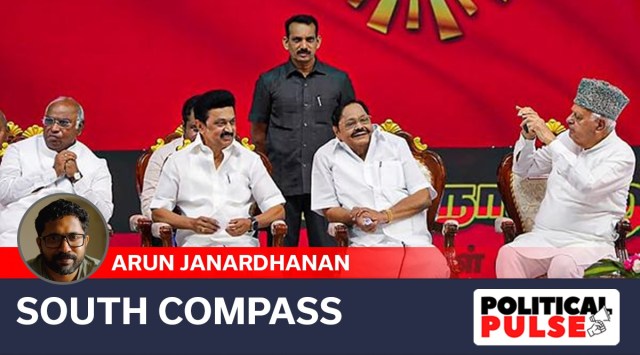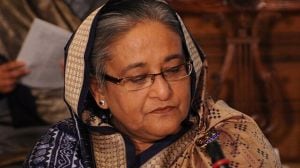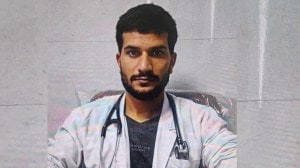Is a national role anywhere on Stalin’s horizon?
His birthday's optics would have helped Opposition cause, but there are many reasons why the DMK chief and Tamil Nadu CM is likely to be more a facilitator than player
 Tamil Nadu CM MK Stalin, Congress President Mallikarjun Kharge and others at an event organised for the celebrations of Stalin's birthday in Chennai. (PTI)
Tamil Nadu CM MK Stalin, Congress President Mallikarjun Kharge and others at an event organised for the celebrations of Stalin's birthday in Chennai. (PTI) In the chatter and scanning of faces that follows after every Opposition grouping, one that left a prominent stamp last week was the star cast that turned up for DMK chief and Tamil Nadu Chief Minister M K Stalin’s birthday. Noises were made about the need to come together, with National Conference president Farooq Abdullah, here all the way from up north in Kashmir, suggesting that Stalin too was prime minister material.
As one of the most electorally significant parties in the Opposition camp, Stalin no doubt wields the weight that the latter desperately needs. However, is a national role anywhere on Stalin’s horizon?
DMK insiders as well as loyalists of the party’s sub-nationalism ideology insist “no”. Unlike other CMs with formidable vote banks such as the Bharat Rashtra Samithi’s K Chandrashekar Rao and the Trinamool Congress’s Mamata Banerjee, Stalin is concerned only with ensuring the DMK remains the dominant force in Tamil Nadu, they say.
It’s from his position in Tamil Nadu that he draws both his powers, and his party’s fortunes, they add.
DMK insiders also point to the history of regional doyens in the state deliberately keeping their distance from Delhi, even if their partymen joined governments at the Centre.
While Stalin will play a crucial role in any joint-Opposition formation in 2024, that is likely to be in the nature of a facilitator, as per his confidants. His camaraderie with leaders across party lines, including KCR and Kerala CM Pinarayi Vijayan of the CPI(M), may also help him emerge as a sort-of coordinator of the UPA in the South.
Thol Thirumavalavan of the VCK, one of Stalin’s closest political allies, recommended at the birthday rally that he embark on a tour across the country.
Incidentally, addressing the rally, in the presence of Congress president Mallikarjun Kharge, Samajwadi Party (SP) chief Akhilesh Yadav, Bihar Deputy CM Tejashwi Yadav, and Farooq Abdullah, Stalin sent a crucial message.
While calling for Opposition parties to come together rather than talk of a “third front” — that is, a non-Congress front – the DMK leader said everybody needed to realise that the challenge in 2024 was not about who would win, but rather who should not win.
If this was a message to regional leaders with national aspirations and anti-Congress leanings, Stalin was also sending a message to the Congress. Days ago, at an election rally in the Northeast, Kharge had spoken of the Congress “leading any Opposition alliance”. At the Tamil Nadu meeting, Kharge said he had never spoken about who would lead or become the PM.
Should Stalin decide to take on a national role, there is incidentally one leader from Tamil Nadu he could look at as an example: the late Congress leader K Kamaraj.
Admired by Jawaharlal Nehru among others, Kamaraj was known for his political craft and friends across parties, making him the Congress’s go-to man for many a crisis. Once considered prime minister material, who preferred to be kingmaker instead, Kamaraj was sidelined after Indira Gandhi saw him as a threat. The challenge he put up to her means he still remains a hero and a known name to many.
Unlike Kamaraj though, who spent years of his life in Delhi’s power corridors, Stalin has never spent much time there, and for a long time, worked under his father’s shadow. At 70, time is hardly on his side to start learning new tricks. He has also won few political battles of the scale that Kamaraj won.
This included the ones the late leader had to fight against Tamil nationalists and leaders like Ma Po Sivagnanam, or Ma Po Si, who accused him of not doing enough to protect the interests of Tamils when the state boundaries were reorganised on linguistic lines. This, in turn, helped Kamaraj gain a more national image.
Asked at his birthday whether he was ready to enter national politics, Stalin incidentally deflected the question, saying he was “already in national politics regardless of public perception”.



- 018 hours ago
- 028 hours ago
- 038 hours ago
- 048 hours ago
- 059 hours ago




























